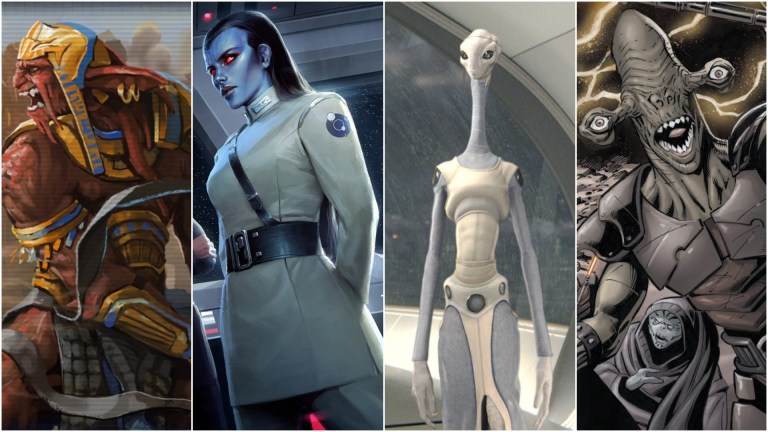Star Wars: Alien Races That Changed the Galaxy
Whether through conquest, a major discovery, or something in between, these are the alien races that turned the tide of history in the galaxy far, far away.

Star Wars is the story of a massive galaxy and the thousands of alien races that inhabit it. More importantly, it’s an epic tale of how these different civilizations come together to live as a galactic community, and the many struggles it often takes to get there.
Like any real-world society, many of the alien races in Star Wars have deep histories that cover everything from their origins and traditions to how they discovered spaceflight and their contributions to the galactic annals. Thanks to the Expanded Universe of books and comics that have spent the last 40 years going way beyond what you’ll ever see on screen, we know all about how the Chiss settled one of the most dangerous corners of space as well as how the Jedi and the Sith were born. We know about many of the earliest races to explore the galaxy, and we’ve learned quite a bit about the massive empire that preceded the one in the movies by millennia.
The point is that the Star Wars universe contains a lot of history, especially when you dig back through the Legends stories that are no longer canon but offer a wide breadth of information on events that predate the eras in which the movies and TV series are set. And now canon stories like The High Republic series are doing the same for the modern Disney continuity.
Stream your Star Wars favorites right here!
Through these stories, we’ve learned of the many alien civilizations that have shaped galactic history, whether through conquest, scientific discovery, interstellar exploration, or some smaller action that still led to a massive sea change in the galaxy. Here are a few of these civilizations that you should know…
Gree, Kwa, and Tythans
The Gree are so ancient that they predate known history in both Legends and Disney canon. Even the most authoritative Gree scholars didn’t know the full scope of their civilization’s history, but we do know that these six-tentacled cephalopods were one of the first alien races to develop a form of hyperspace technology and explore the stars. While the Gree settled many planets and built an empire, they most famously discovered Tython, a once-hidden planet strong in the Force that would become the birthplace of the Jedi Order.
While the Gree had long abandoned the planet (and the known galaxy) by the time the pilgrims who would become the Jedi arrived, they weren’t the only ancient civilization to live on Tython before the days of the Jedi. Next came the Kwa, who were actually contemporaries of the Gree. They were best known for having built the Infinity Gates, a network of structures that allowed them to travel from one point in the galaxy to the other instantaneously — a far more advanced method of interstellar travel than even hyperspace.
But much of this Kwa technology and knowledge had been lost to time when the Force-sensitive pilgrims representing many of the galaxy’s species arrived on the planet and formed the Je’daii Order, the precursor to the religious faction of protectors we know today. These people are also referred to as the local Tythans, an ancient civilization that studied and learned to wield the Force, both the light and dark sides…
Rakata
During the time of the Gree and Kwa, there was also the vicious warrior race known as the Rakata, a primitive cannibalistic society that would one day escape their home world of Lehon and conquer the rest of the galaxy to form the Infinite Empire. Originally discovered by the Kwa, the Rakata learned about the ways of the Force from the more advanced species and quickly embraced the dark side. They created Force-powered hyperdrives and captured Force-sensitive slaves to power their ships, and when they turned on the Kwa in order to take the Infinity Gates for themselves, the Kwa were forced to destroy the network. Ultimately, the Rakata wiped out most of the Kwa, and what was left of that once-advanced civilization eventually devolved into a species of creatures known as the Kwi.
Needless to say, the Rakata were known for two things: their immense cruelty and the massive empire that connected over 500 planets. At the height of their power, the Rakata developed many other Force-powered machines, including the Star Forge, a space station that fed on the dark side and the energy of a nearby star to create an endless supply of battleships and weapons for their war machine.
But like all empires, the Infinite Empire eventually fell. Millennia of wars with other races, in-fighting, and a mysterious plague that cut them off from the Force left the Rakata broken and virtually extinct. The few Rakata that remained centuries later no longer even knew how to power their own technology.
Sith
The original Sith that existed tens of thousands of years before Palpatine hailed from the planet Korriban (known as Moraband in the new canon) and were very different to the Sith Lords you know from the movies. In fact, the ancient Sith were a unique species of humanoids with red skin and facial tentacles with their own culture and traditions. But they do have one thing in common with the villains of the Skywalker Saga: they worshiped and practiced the dark side of the Force.
The Sith species eventually interbred with a faction of Human Dark Jedi outcasts who had left the known galaxy after a long, bloody war with their light side-worshiping counterparts (a story for another time). It was during this period that the Sith people amassed a great empire of their own and fought many wars against the Republic and the Jedi.
But more long-lasting than their ancient empire — long dead by the time of the movies — are their traditions, religious belief in the dark side, and the many artifacts and teachings they left behind for the Palpatine’s order of Sith to discover and use to conquer the galaxy. Sith holocrons scattered across space contained many great secrets about the Force, while tombs located on Korriban/Moraband were home to the histories of many of the greatest Dark Lords of the Sith, including one worshiped by the Sith Eternal in The Rise of Skywalker. Without this ancient species, there would be no Sith as we know them today.
Chiss
The blue-skinned and red-eyed Chiss are a mystery to most. In fact, besides the infamous Grand Admiral Thrawn, few Chiss have ever operated in the known galaxy, preferring to instead rule their empire in the uncharted, difficult-to-navigate, and dangerous region of space known as the Unknown Regions (where the Sith planet Exegol from The Rise of Skywalker was also located). Republic historians knew very little about the origin of the Chiss or how they formed their hidden empire, but one theory suggests they evolved from a forgotten group of human colonists who traveled into the Unknown Regions and never returned.
But while most Chiss preferred to keep to themselves on their home planet of Csilla, and the Chiss Ascendancy largely remained neutral in most galactic conflicts, Thrawn changed all that, bringing Chiss brilliance and strategy to the forefront of the Galactic Civil War. Legends introduces Thrawn as the new leader of what’s left of the Empire after Return of the Jedi, while Disney canon introduces him much earlier as a Grand Admiral operating at the height of Imperial power before the Original Trilogy. Regardless of the entry point, this master military tactician left an indelible mark on the galaxy, securing his people’s place in history, even as the Chiss as a civilization continued to confound scholars.
Kaminoans
Although we didn’t actually get to see this era of Star Wars until 25 years after A New Hope, the Clone Wars have been a key part of the history of the galaxy far, far away since the very beginning. In fact, a brief mention of the Clone Wars in the first movie was one of the first signs that there was a big, epic history beyond the scope of the story being told. Obi-Wan describes the Clone Wars as the stuff of legend to a young, impressionable Luke, a time when the Jedi were at the height of their power. Of course, the Prequel Trilogy painted a much bleaker picture.
Regardless of the point of view, few would argue that the Kaminoans played a pivotal role in the Clone Wars, not only as the creators of the clones themselves but as the civilization that pretty much single-handedly turned the tide of war and set the stage for the Empire’s rise to power and the near-extinction of the Jedi. Before the Kaminoans delivered its massive clone army, the Republic had no army of the scale needed to fight the Separatist forces threatening to dismantle the galactic government. But by the time Palpatine was ready to unleash his ultimate plan at the end of the Clone Wars, he had the endlessly renewable fighting force he needed to do whatever he pleased. And thus, a largely benevolent alien civilization’s dark legacy was solidified.
Geonosians
The future Emperor and Dark Lord of the Sith didn’t just have designs for a grand army that he’d one day turn against a weakened Jedi Order, he also wanted to build the ultimate superweapon with which to control the rest of the galaxy. When it came time to begin construction of the dreaded Death Star, Palpatine turned to the industrious Geonosians, an insectoid species with the ingenuity needed for such a massive undertaking.
Geonosis will always be known as the planet where the Clone Wars began, but it was also the site of one of the most consequential military achievements in Star Wars history, as Geonosians set out to not only design the plans for the deadly space station but build it in the planet’s orbit. But their efforts were not rewarded. Not only did the Geonosians suffer terrible casualties for their part in the opening battle of the Clone Wars, but once the Emperor had no more use for them after the war, he ordered his forces to poison the planet with gas that effectively sterilized and killed the entire Geonosian population. The goal of this monstrous genocide? To keep the Death Star a secret until the time was right.
Bothans
While the Geonosians were key to the Death Star’s design and construction, crafty Bothans played a pivotal role in ending the space station’s reign of terror once and for all. You likely remember Mon Mothma’s words in Return of the Jedi: “Many Bothans died to bring us this information.” It’s a solemn moment that barely scratches the surface of one of the most important espionage operations ever conducted.
Known for their cunning and elite spy network, the Bothans worked tirelessly to secure the location of the second Death Star project. These spies also discovered that the Emperor planned to visit the station, presenting the perfect moment for the Rebellion to strike at the very heart of the Empire. The result of Bothan sacrifice was a killing blow to the tyrannical government and the death of the Emperor.
Yuuzhan Vong
One of the most controversial races ever introduced to Star Wars, the Yuuzhan Vong came from outside the known galaxy and played the role of classic alien invaders hellbent on conquering all planets in their path. They were known for their bio-organic weaponry, armor, technology, and vessels as well as for being largely impervious to the Force, making them the ultimate foe for Luke Skywalker’s New Jedi Order in the Legends continuity.
The Yuuzhan Vong waged a war on the New Republic that not only led to the death of Chewbacca and Anakin Solo, the youngest son of Han and Leia, but to the dismantling of the Republic itself. Everything the Rebellion had fought so hard for during the Galactic Civil War was shattered. Whether you like them or not, the Yuuzhan Vong took down the New Republic in Legends canon more than a decade before we even knew what the First Order was.
Let us know in the comments if you think we missed anyone and we may add them to the list!



